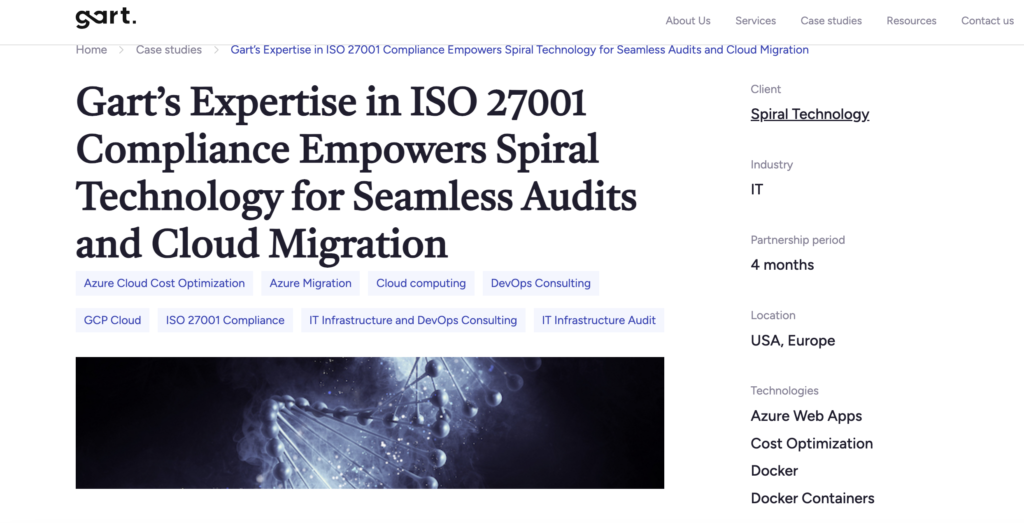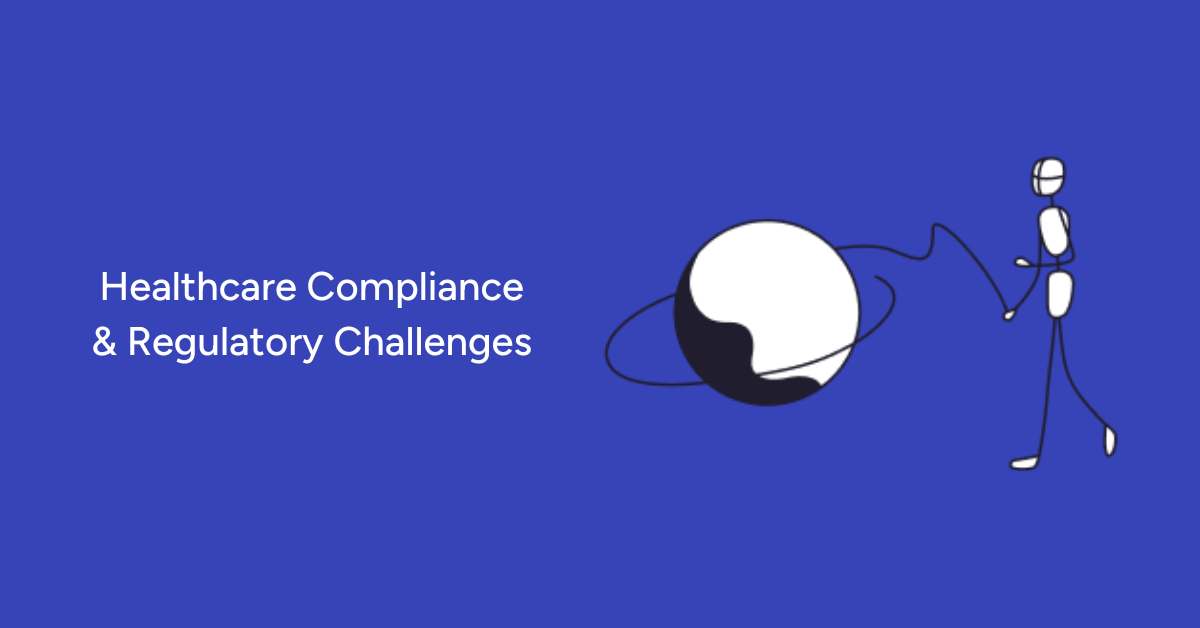
Healthcare companies are under constant pressure to deliver high-quality patient care while managing vast amounts of data, complying with regulatory requirements, and adapting to new technologies.
DevOps, a set of practices that combines software development (Dev) and IT operations (Ops), offers significant advantages for healthcare organizations striving to meet these challenges. In this article, we will explore the best practices and benefits of DevOps for healthcare companies.
Regulated Industry
One of the most regulated industry due to compliance standards (HIPAA, HITECH Act, FDA, CMS, JCAHO, etc)
Compliance StandardDescriptionImpact on DevOps PracticesHIPAAHealth Insurance Portability and Accountability ActRequires strict data security and privacy measures, necessitating encryption, access controls, and audit trails. DevOps practices must ensure compliance at all stages.HITECH ActHealth Information Technology for Economic and Clinical Health ActEncourages the adoption of electronic health records and sets standards for data breach notification. DevOps practices need to secure electronic health records and establish efficient breach response procedures.FDAFood and Drug AdministrationEnforces regulations on the development and deployment of medical devices and pharmaceutical software. DevOps in healthcare must adhere to rigorous compliance checks, documentation, and validation.CMSCenters for Medicare & Medicaid ServicesRegulates healthcare payment and service delivery. DevOps practices must align with regulations to ensure efficient billing, payments, and service quality.JCAHOJoint Commission on Accreditation of Healthcare OrganizationsProvides accreditation for healthcare organizations. DevOps practices play a role in meeting accreditation standards related to patient safety, care quality, and data security.GDPRGeneral Data Protection Regulation (EU)Applies to healthcare organizations that handle EU patient data. DevOps practices must include data protection and consent mechanisms to comply with GDPR requirements.These compliance standards impact DevOps practices by requiring specific security, data protection, documentation, and quality assurance measures tailored to the respective industry's needs.
Specific DevOps Practices Tailored for the Healthcare Industry
HIPAA Compliance
Healthcare organizations deal with sensitive patient data subject to the Health Insurance Portability and Accountability Act (HIPAA). DevOps teams must prioritize HIPAA compliance by implementing encryption, access controls, and audit trails in their pipelines.
Automated Testing for Regulatory Compliance
Healthcare applications often need to adhere to strict regulatory standards. Automated testing should include compliance checks to ensure that software meets healthcare-specific regulations and standards.
Patient Data Security - Encryption & Data Masking
Protecting patient data is a top priority. DevOps should focus on securing data at rest and in transit, and implementing robust identity and access management (IAM) practices.
Utilize strong encryption algorithms to protect sensitive healthcare data when it is stored (at rest) and when it is transmitted (in transit). This ensures that even if unauthorized access occurs, the data remains unreadable and secure.Additionally, implement data masking in non-production environments to protect patient data during development and testing, aligning with stringent healthcare data security requirements.These methods allow for the realistic testing and development of applications without exposing actual patient data. Sensitive elements within the data are replaced with fictional or masked values, preserving data privacy and HIPAA compliance.
Zero Downtime
Healthcare services can't afford downtime. DevOps should aim for zero-downtime deployments, using strategies like blue-green deployments or canary releases to minimize disruptions to patient care.
Disaster Recovery and Redundancy
In the healthcare sector, maintaining high availability is paramount. To safeguard against potential system failures, DevOps must incorporate robust disaster recovery and redundancy measures. These measures are crucial for ensuring uninterrupted operations and patient care, especially in the face of unforeseen disasters or critical system issues. Gart, known for its expertise in this area, offers specialized solutions for Backup & Disaster Recovery to bolster healthcare system resilience.
Change Management and Version Control
Strict change management and version control are essential in healthcare to track modifications, updates, and configurations. DevOps tools can help manage and document these changes effectively.
Collaboration with Clinical Teams
DevOps teams should collaborate closely with clinical professionals to understand their needs and feedback. This ensures that software aligns with clinical workflows and improves patient care.
Performance Monitoring
Implement robust performance monitoring to proactively identify and resolve issues before they impact patient care. Real-time monitoring of healthcare systems is crucial for maintaining service levels.
Regulated Data Retention and Backup
Data retention and backup policies need to comply with healthcare data retention regulations. DevOps practices should include automated data backup and secure storage management.
? Looking to streamline your operations, boost security, and scale effectively? Reach out to Gart's DevOps specialists for a transformation. ? Contact Gart Today!
Cross-Functional Training
Encourage cross-functional training between IT staff and healthcare professionals to foster a deeper understanding of healthcare processes and IT requirements.
Non-Disruptive Updates
Develop strategies for non-disruptive software updates to minimize disruptions during critical patient care procedures. Implement rolling updates or feature flags to control new functionalities.
Serverless Agility
With a serverless architecture, healthcare companies are liberated from the burden of managing servers and infrastructure. Serverless platforms seamlessly adjust resource scaling according to demand, ensuring your SaaS application effortlessly adapts to varying user activity levels without the need for manual interventions. You focus on coding, while the cloud does the rest, significantly simplifying operations.
Incident Response Planning
Develop and regularly test incident response plans tailored to healthcare scenarios to ensure quick recovery in case of security breaches or system failures.
Containerization and Microservices
Utilize containerization and microservices to enhance scalability, portability, and resource efficiency, while maintaining healthcare application performance.
Secure Code Practices
Promote secure coding practices within DevOps teams to reduce vulnerabilities in healthcare software, where data security is of utmost importance.
Comprehensive Documentation
Maintain comprehensive documentation for all DevOps processes and configurations, facilitating auditing and ensuring healthcare software integrity.
By integrating these healthcare-specific DevOps practices, healthcare organizations can enhance their ability to provide high-quality patient care while complying with regulatory standards and maintaining data security. These practices ensure that the benefits of DevOps are tailored to the unique demands of the healthcare industry.
DevOps in Healthcare: Best Practices
Automation
DevOps encourages automation across the entire software development and deployment lifecycle. This includes automating code testing, deployment, and monitoring. In healthcare, where patient safety and data security are paramount, automation reduces the risk of human error and enhances compliance with regulatory requirements.
Collaboration
DevOps fosters a culture of collaboration between development and operations teams. Healthcare organizations can benefit from improved communication, leading to faster issue resolution, more efficient deployments, and better overall patient care.
Continuous Integration and Continuous Deployment (CI/CD)
The CI/CD pipeline is a fundamental DevOps practice. It allows healthcare companies to make rapid and frequent software releases while maintaining high quality. This agility is crucial for adapting to changing healthcare needs.
Security
The healthcare industry is a prime target for cyberattacks due to the sensitive nature of patient data. DevOps integrates security from the beginning of the development process, making it easier to identify and mitigate vulnerabilities. Regular security testing and automated compliance checks enhance data protection.
Monitoring and Feedback
Continuous monitoring and feedback loops in DevOps help healthcare organizations identify and address issues promptly. Real-time insights into system performance and user experience enable proactive problem-solving and ensure the highest level of patient care.
Benefits of DevOps in Healthcare
Improved Patient Care: DevOps practices enhance the quality and reliability of healthcare software, contributing to improved patient care. Faster deployments and quicker issue resolution mean healthcare professionals can access critical tools without disruption.
Cost Efficiency: Automation reduces manual intervention, resulting in cost savings. With healthcare costs continually under scrutiny, DevOps helps companies allocate resources more efficiently.
Regulatory Compliance: DevOps streamlines compliance efforts by automating documentation and ensuring security and privacy requirements are met. This minimizes the risk of penalties associated with non-compliance.
Faster Innovation: The ability to release new features and updates quickly enables healthcare companies to innovate in response to changing patient needs, market demands, and technological advancements.
Data Security: DevOps best practices for security ensure that patient data remains confidential and protected. Timely detection and remediation of vulnerabilities help prevent data breaches.
Enhanced Productivity: By automating time-consuming tasks and promoting collaboration, DevOps frees up resources and allows healthcare professionals to focus on patient care rather than IT issues.
Case Studies: E-Health DevOps Transformation
CI/CD Pipelines and Infrastructure for E-Health Platform
Explore how Gart Solutions transformed a healthcare development company's Electronic Medical Records Software (EMRS) for a government E-Health platform and CRM systems. Gart implemented CI/CD pipelines and on-premises infrastructure, adhering to strict HIPAA and GDPR standards.By leveraging local cloud provider GiGa Cloud's hardware, utilizing VMWare ESXi and Terraform, and implementing data-masking techniques, they ensured secure and compliant data management.
Seamless Rails Application Migration: Transitioning from HealthCareBlocks to AWS with HIPAA Compliance
Gart orchestrated a smooth and comprehensive migration of a Ruby on Rails application from HealthCareBlocks to Amazon AWS. With meticulous attention to detail, Gart prioritized HIPAA compliance, safeguarded data integrity, and ensured the continued seamless operation of the application in its new cloud environment.
Healthcare SaaS: Cloud Engineer's Journey in CI/CD, Terraform, and Cloud Migration
Gart took on the challenge at a high-growth healthcare SaaS company, where the task was to revamp CI/CD pipelines for both .NET and Node.js environments and implement Terraform infrastructure. Alongside these tasks, Gart orchestrated a smooth AWS to Azure migration. Gart's impeccable work ensured PHI access compliance. Gart seamlessly interfaced with a US-based team.
? Are you seeking to streamline your operations, enhance security, and improve scalability? Transform operations and security with Gart's DevOps experts. ? Contact Gart Today!
Conclusion
DevOps has rapidly become a key driver of efficiency, security, and innovation in the healthcare industry. By adopting DevOps best practices, healthcare companies can provide better patient care, reduce costs, meet regulatory requirements, and stay competitive in a rapidly evolving field. As the industry continues to evolve, embracing DevOps will be essential for healthcare organizations to thrive in an increasingly digital and data-driven world.

Business Continuity (BC) constitutes a comprehensive managerial process that serves as a safeguard to ensure an organization's capacity to sustain its crucial operations and deliver indispensable services, even in the face of an array of disruptive forces. These potential disruptions encompass a spectrum of challenges, ranging from natural disasters, technological glitches, and cyberattacks to unforeseen and abrupt events.
[lwptoc]
At its core, a Business Continuity Plan (BCP) aims to ensure the seamless operation of essential functions in challenging circumstances, safeguarding critical services and workflows. It mitigates disruptions, reducing downtime and losses while protecting stakeholders like employees, clients, and suppliers. Regulatory compliance is key to avoiding legal issues.
Moreover, BCPs enhance an organization's reputation, demonstrating reliability and building trust. They also promote financial stability by minimizing losses and maintaining revenue in the face of disasters.
Common Business Risks and Vulnerabilities
Businesses encounter a diverse range of hazards and vulnerabilities that can disrupt their operations and jeopardize their sustainability.
Natural Calamities
Technological Hiccups
Supply Chain Interruptions
Human Variables
Regulatory Transformations
Economic Variables
Common risks include natural disasters like earthquakes, floods, and wildfires, which damage infrastructure. Technological issues such as hardware failures and cyber threats can disrupt digital operations. Overreliance on suppliers can affect production, while human errors or malicious actions may cause disruptions, especially if key personnel are unavailable. Regulatory changes impact operations, and economic factors like downturns and market volatility can affect financial stability
Without a robust BCP, businesses risk prolonged downtime, financial losses, and customer dissatisfaction, potentially leading to closure. This can also harm their reputation, result in revenue decline, and lead to regulatory penalties. Inadequate crisis management can erode trust, jeopardize employee safety, and hinder competitiveness.
Business Continuity Preparation Checklist
Step/ConsiderationDescription/NotesRisk AssessmentIdentify and assess potential risks and threats to the business. This includes natural disasters, cybersecurity threats, supply chain disruptions, etc.Business Impact Analysis (BIA)Conduct a BIA to determine the criticality of various business functions, their dependencies, and the impact of downtime.BCP Team FormationEstablish a dedicated team responsible for developing, implementing, and maintaining the Business Continuity Plan (BCP).Set Objectives and PrioritiesDefine clear objectives for the BCP, prioritize critical functions, and allocate resources accordingly.Communication PlanDevelop a comprehensive communication plan for both internal and external stakeholders during emergencies.BCP DocumentationCreate detailed BCP documentation, including policies, procedures, and recovery plans for each critical function.Resource AllocationAllocate the necessary resources, including personnel, technology, and financial resources, to support BCP implementation.Training and AwarenessProvide training and awareness programs to ensure employees understand their roles and responsibilities in the BCP.Technology and Data ProtectionImplement technology solutions for data backup, redundancy, and cybersecurity to safeguard critical systems and data.Supplier and Partner EngagementEngage with suppliers and partners to ensure they have their own BCPs in place and align with your continuity efforts.Testing and ExercisesRegularly test the BCP through tabletop exercises, functional drills, and full-scale simulations.Continuous ImprovementEstablish a process for collecting feedback, learning from incidents, and updating the BCP to enhance its effectiveness.Regulatory ComplianceEnsure the BCP complies with relevant regulations and industry standards.Alternative Facilities and Remote WorkIdentify backup facilities and establish remote work capabilities to maintain operations during facility disruptions.Crisis Communication Tools and ChannelsImplement tools and communication channels (e.g., emergency notification systems) for rapid dissemination of information during crises.Recovery Time Objectives (RTOs)Define specific RTOs for each critical function, indicating the acceptable downtime for recovery.Legal and Compliance ConsiderationsConsider legal and compliance aspects, including contractual obligations, insurance coverage, and data protection regulations.Vendor and Service Provider AssessmentEvaluate the resilience of vendors and service providers to ensure they can support your BCP.Incident Response PlanDevelop a detailed incident response plan to guide immediate actions during emergencies.Employee Safety and Well-beingEstablish measures for ensuring employee safety and providing support during crises.Financial PreparednessMaintain financial reserves or insurance coverage to cover costs associated with BCP implementation and recovery efforts.Record-Keeping and DocumentationMaintain records of BCP activities, tests, and incidents for auditing and reporting purposes.Periodic Reviews and UpdatesSchedule regular reviews of the BCP to assess its relevance and update it as needed based on changing risks and circumstances.
Preparing for Business Continuity
Risk Assessment
Conducting a comprehensive risk assessment is a fundamental step in preparing for business continuity, forming the foundation of the Business Continuity Plan (BCP). The process of conducting a risk assessment involves several essential steps.
Organizations identify potential risks through various means, including historical data review, employee interviews, and industry trend analysis. Common risk categories include natural disasters, technological failures, human errors, and external threats such as cyberattacks.
Risks are categorized based on their severity and potential to disrupt operations. Priority is given to critical risks that could significantly impact the business. Comprehensive risk assessment process is vital in enhancing an organization's readiness and resilience in the face of potential disruptions.
Business Impact Analysis (BIA)
A Business Impact Analysis (BIA) is a crucial component of the BCP as it focuses on understanding the specific impact of disruptions on the organization. Its role includes:
Prioritizing Critical Functions
A BIA identifies and prioritizes critical business functions and processes, helping organizations determine which areas require the most attention during recovery efforts.
Determining Recovery Time Objectives (RTOs)
By analyzing the BIA results, organizations can establish RTOs, which specify the maximum allowable downtime for critical functions.
Resource Allocation
The BIA informs resource allocation decisions, ensuring that resources are directed towards recovering the most vital aspects of the business.
Risk Reduction
It helps organizations understand how different risks may affect their operations and allows them to proactively mitigate these risks.
? Ready to safeguard your data and ensure business continuity? Don't wait for a disaster to strike. Take proactive steps now with our Backup and Disaster Recovery Service!
BCP Team
Establishing a BCP team is essential for effective preparedness. Key roles and responsibilities include:
BCP Coordinator: Oversees the entire BCP process, ensures alignment with organizational goals, and coordinates all BCP activities.
Team Leaders: Appointed to lead specific recovery teams or departments, responsible for implementing recovery strategies.
Communication Coordinator: Manages internal and external communication during emergencies and ensures timely updates to stakeholders.
Resource Coordinator: Manages resource allocation, procurement, and logistics required for recovery efforts.
IT Specialist: Focuses on IT recovery strategies, including data backup, system restoration, and cybersecurity.
Safety and Security Officer: Ensures the safety and security of employees, facilities, and assets during disruptions.
HR Liaison: Addresses personnel-related issues, including employee well-being, workforce mobilization, and HR policies during recovery.
Legal and Regulatory Compliance
Various industries and jurisdictions have specific regulations related to business continuity planning. Common examples include:
Financial Industry. Regulations like Basel III require financial institutions to have robust BCPs in place to ensure financial stability.
Healthcare. The Health Insurance Portability and Accountability Act (HIPAA) mandates that healthcare organizations have contingency plans for protecting patient data and ensuring continued patient care during emergencies.
Energy Sector. Regulations in the energy sector often require utilities to have BCPs to maintain critical infrastructure and services.
Developing the Business Continuity Plan
Business Continuity Strategies
Business Continuity Strategies encompass a range of proactive measures and plans aimed at sustaining critical operations during disruptions. These strategies may involve establishing backup facilities, leveraging cloud solutions, and making risk-informed selections to ensure an organization's resilience in the face of adversity.
Emergency Response
Emergency Response involves the development and implementation of procedures and protocols to address immediate crises and disruptions effectively. It emphasizes rapid and coordinated actions, with a primary focus on safeguarding people, assets, and critical operations. Effective communication and swift decision-making are vital components of a robust emergency response plan.
Data Backup and Recovery
Data Backup and Recovery entail the establishment of systematic processes for safeguarding and restoring critical data and information. This includes routine backups of essential data, the creation of redundancy measures, and the provision of clear procedures for data retrieval in the event of data loss or system failures. The aim is to minimize data-related disruptions and ensure the continuity of essential business functions.
Data backup and recovery procedures involve:
Regular automated backups of critical data.
Testing the integrity of backups to ensure data recoverability.
Detailed recovery plans specifying who is responsible for data restoration.
Off-site backup storage to safeguard data in case of on-site disasters.
Testing and Maintenance
Regular testing of the BCP is essential to ensure its effectiveness. It allows organizations to assess their preparedness, identify weaknesses, and refine response procedures. Various testing methods, such as tabletop exercises and drills, are employed to simulate different scenarios and evaluate the plan's robustness.
To comprehensively evaluate our BCP, we employ a range of testing methods, including:
Tabletop Exercises: These scenario-based discussions involve key stakeholders to simulate crisis situations, fostering collaboration, and identifying areas for improvement.
Functional Drills: Practical exercises replicate real-world scenarios, enabling employees to execute specific BCP tasks and assess their effectiveness.
Full-Scale Simulations: These elaborate tests mimic large-scale disasters, testing the entire BCP and its ability to handle complex situations.
IT Recovery Testing: Ensures the functionality of our IT systems and data recovery procedures, including failover tests for critical applications.
Continuous improvement is a key aspect of BCP management. It involves gathering feedback from testing and real-world incidents, learning from experiences, and applying those lessons to enhance the BCP. This iterative process ensures that the plan remains relevant and resilient to evolving challenges.
To ensure our BCP remains robust and adaptable, we follow a structured process for updating and improvement:
Post-Testing Evaluation: After each test or real incident, we conduct a thorough review to capture feedback and lessons learned.
Analysis and Prioritization: We analyze the feedback and prioritize areas that require attention based on their impact and criticality.
Revision and Enhancement: The BCP is revised to address identified weaknesses, incorporating improvements and updates.
Communication: Revised BCP versions are communicated to all relevant stakeholders, and training and awareness programs are conducted as needed.
Regular Review: We establish a schedule for periodic BCP reviews, ensuring that it remains aligned with our business goals and current risk landscape.
Conclusion
To facilitate the execution of an effective Business Continuity Plan tailored to your organization's unique needs, consider Gart's Backup and Disaster Recovery Services. These services provide comprehensive support and resources for crafting a resilient BCP that aligns seamlessly with your operational landscape. Gart's expertise ensures that your BCP is robust, adaptable, and in compliance with relevant regulations, all while safeguarding your reputation and financial stability. With Gart's Backup and Disaster Recovery Services, your organization can confidently navigate disruptions and emerge stronger on the other side.

Are you contemplating the shift to cloud computing? As businesses increasingly embrace the benefits of cloud technology, it's crucial to make an informed decision when selecting a cloud provider (AWS vs Azure vs Google Cloud). With numerous options available, it can be overwhelming to determine the best fit for your specific needs.
[lwptoc]
But fear not! In this comprehensive blog post, we'll delve into various cloud providers and assist you in identifying the ideal choice for your organization.
CriteriaAmazon Web Services (AWS)Microsoft AzureGoogle Cloud Platform (GCP)PricingOffers various pricing models and options, including pay-as-you-go and reserved instances.Flexible pricing options, including pay-as-you-go and discounted reserved instances.Offers pay-as-you-go pricing and committed use discounts.Compute ServicesProvides a wide range of compute services, including EC2, Lambda, and Elastic Beanstalk.Offers compute services like Virtual Machines, App Service, and Azure Functions.Provides compute services such as Compute Engine, App Engine, and Kubernetes Engine.Storage OptionsProvides various storage services, including S3, EBS, and Glacier.Offers storage services like Blob Storage, File Storage, and Azure Disk Storage.Provides storage services such as Cloud Storage, Cloud SQL, and Cloud Bigtable.Machine Learning and AI CapabilitiesOffers comprehensive AI and machine learning services with Amazon SageMaker, Rekognition, and more.Provides AI and ML capabilities through services like Azure Machine Learning, Cognitive Services, and more.Offers AI and ML services through Google Cloud AI, AutoML, and TensorFlow.Database ServicesProvides a wide range of database options, including Amazon RDS, DynamoDB, and Redshift.Offers database services like Azure SQL Database, Cosmos DB, and Azure Database for MySQL.Provides database services such as Cloud SQL, Firestore, and BigQuery.NetworkingOffers extensive networking capabilities, including Amazon VPC, Route 53, and CloudFront.Provides networking services like Azure Virtual Network, Azure DNS, and Azure ExpressRoute.Offers networking services such as Virtual Private Cloud (VPC), Cloud DNS, and Cloud Load Balancing.Global InfrastructureOperates in numerous regions worldwide with a large number of data centers.Has an extensive global presence with data centers located in many regions.Has a global network of data centers and regions to provide wide coverage.SupportProvides extensive documentation, support forums, and options for technical support.Offers comprehensive documentation, support options, and access to Azure support engineers.Provides documentation, community support, and access to Google Cloud support resources.A high-level overview of the different cloud providers
Pros and Cons: AWS vs Azure vs Google Cloud
Amazon Web Services (AWS)
Pros:
Extensive Service Offering: AWS has a vast range of services, including compute, storage, databases, AI/ML, networking, and more, providing comprehensive solutions for various business needs.
Market Leader: AWS is the leading cloud provider with a strong track record, extensive customer base, and a robust ecosystem of third-party integrations.
Global Infrastructure: AWS has a vast global infrastructure with multiple data centers worldwide, allowing businesses to have low-latency access and meet data sovereignty requirements.
Scalability and Flexibility: AWS offers auto-scaling features and flexible resource allocation, enabling businesses to easily scale up or down based on demand.
Strong Security Measures: AWS provides a wide range of security tools, encryption options, and compliance certifications to ensure the protection of data and meet regulatory requirements.
Cons:
Complex Pricing Structure: AWS pricing can be complex, especially when using a variety of services. Understanding the pricing models, estimating costs, and optimizing expenses may require careful planning and monitoring.
Steep Learning Curve: AWS has a rich set of services and features, which can make it challenging for beginners to navigate and fully utilize the platform. Learning resources and training may be necessary for effective usage.
Limited Support Options: While AWS provides documentation and support forums, some users have reported challenges with response times and the availability of personalized support.
Microsoft Azure
Pros:
Seamless Integration with Microsoft Products: Azure offers seamless integration with popular Microsoft tools and technologies, making it attractive for businesses already using the Microsoft ecosystem.
Hybrid Cloud Capabilities: Azure provides strong support for hybrid cloud scenarios, allowing businesses to seamlessly integrate on-premises infrastructure with the cloud.
Wide Range of Services: Azure offers a comprehensive set of services, including compute, storage, databases, analytics, and more, catering to diverse business needs.
Strong Enterprise Focus: Azure is well-suited for enterprise environments, with features like Active Directory integration, strong governance tools, and compliance certifications.
Global Presence: Azure has a wide global presence with data centers located in various regions, enabling businesses to have a global reach and meet local compliance requirements.
Cons:
Learning Curve for Non-Microsoft Users: Users not familiar with Microsoft technologies may face a learning curve when navigating Azure's services and features.
Some Services Still Maturing: While Azure offers a wide range of services, some may still be evolving and may not have the same maturity or feature set as those of AWS.
Limited Marketplace Offerings: The Azure Marketplace may have a smaller selection of third-party solutions compared to AWS, although it continues to grow.
Google Cloud Platform (GCP)
Pros:
Strong AI and ML Capabilities: GCP is known for its advanced AI and ML services, offering pre-trained models, custom machine learning, and data analytics capabilities.
Cost-Effective Pricing: GCP's pricing structure is known for its simplicity and cost-effectiveness, with competitive pricing options and sustained usage discounts.
Scalable and Elastic Infrastructure: GCP provides flexible scaling options, allowing businesses to easily handle varying workloads and traffic spikes.
Global Network and Performance: GCP offers a high-performance global network, enabling businesses to deliver applications and services with low latency.
Developer-Friendly: GCP provides a range of developer tools and integration options, making it attractive for developers and DevOps teams.
Cons:
Smaller Market Share: GCP currently has a smaller market share compared to AWS and Azure, which may result in a comparatively smaller ecosystem and fewer third-party integrations.
Limited Enterprise Focus: GCP may be perceived as more focused on startups and developer-centric use cases, although it continues to expand its enterprise capabilities.
Learning Curve for Non-Google Users: Users who are not familiar with Google's technologies may need to invest time in learning and adapting to GCP's platform and services.
? Unable to choose a cloud provider? Seek expert guidance from Gart. Our experienced team can help you navigate the complexities of cloud computing and select the optimal provider for your business.
How to Choose a Cloud Service Provider
Choosing a cloud service provider requires careful consideration of several factors. Here are the key steps to guide you in selecting the right cloud service provider for your business:
Define Your Business Requirements:
Understand your business requirements and goals.
Evaluate services, performance, and security measures.
Consider global infrastructure and data centers.
Assess integration capabilities and ease of migration.
Evaluate disaster recovery options and pricing models.
Seek feedback and conduct trials to make an informed choice.
To begin the process of selecting the right cloud service provider for your business, it is crucial to gain a deep understanding of your organization's needs, objectives, and unique requirements in relation to cloud services. Take into account various factors, such as the types of workloads you handle, your storage and computing requirements, scalability expectations, compliance obligations, and any industry-specific regulations that apply.
Conduct a comprehensive workload analysis to assess the specific applications and workloads your business relies on. Consider the nature of these workloads, whether they involve web hosting, data analytics, AI/ML processing, e-commerce, or other operations. Identify the computing resources, storage needs, and network prerequisites associated with each workload.
This table provides a brief overview of the compute services offered by each cloud provider:
Cloud ProviderCompute ServicesAWSAmazon EC2 (Elastic Compute Cloud)AWS Lambda (Serverless Computing)Amazon ECS (Elastic Container Service)AWS Batch (Batch Computing)AWS Elastic Beanstalk (Platform-as-a-Service)AzureAzure Virtual MachinesAzure Functions (Serverless Computing)Azure Container InstancesAzure Batch (Batch Computing)Azure App Service (Platform-as-a-Service)GCPGoogle Compute EngineGoogle Cloud Functions (Serverless Computing)Google Kubernetes Engine (Managed Kubernetes)Google Cloud Run (Container Instances)Google App Engine (Platform-as-a-Service)A table comparing the compute services offered by AWS vs Azure vs Google Cloud
Determine the scalability and flexibility your business demands. Evaluate whether you require the capability to quickly scale resources up or down in response to fluctuating demands. Consider whether potential cloud providers offer features like auto-scaling, elastic load balancing, and flexible resource allocation to meet your scalability requirements effectively.
Evaluate your data storage and database needs. Analyze the volume of data your business needs to store and process, as well as the specific data access patterns (real-time, batch processing) that are crucial to your operations. Consider the level of data durability, redundancy, and availability required. Assess the availability of different storage options (such as object storage or block storage) and the variety of database solutions (relational or NoSQL) offered by each cloud service provider.
Here's a table comparing the database and storage services offered by AWS, Azure, and GCP
Cloud ProviderDatabase ServicesStorage ServicesAWSAmazon RDS (Relational Database Service)Amazon S3 (Simple Storage Service)Amazon DynamoDB (NoSQL Database)Amazon EBS (Elastic Block Store)Amazon Aurora (Managed Relational Database)Amazon Elastic File System (EFS)Amazon DocumentDB (MongoDB-compatible Document Database)Amazon FSx (File Storage)Amazon Neptune (Graph Database)Amazon Glacier (Long-term Archive Storage)AzureAzure SQL DatabaseAzure Blob StorageAzure Cosmos DB (NoSQL Database)Azure Files (Managed File Storage)Azure Database for MySQLAzure Disk StorageAzure Database for PostgreSQLAzure Archive Storage (Long-term Archive Storage)Azure Synapse Analytics (Data Warehousing)Azure Data Lake StorageGCPGoogle Cloud SQL (Managed Relational Database Service)Google Cloud StorageGoogle Cloud Firestore (NoSQL Document Database)Google Cloud Persistent DiskGoogle Cloud Spanner (Horizontally Scalable Relational Database)Google Cloud FilestoreGoogle Cloud Bigtable (Wide-column NoSQL Database)Google Cloud Storage Nearline (Long-term Archive Storage)Google Cloud Datastore (NoSQL Database)Google Cloud Archive Storage (Long-term Archive Storage)AWS vs Azure vs Google Cloud: database and storage services
Assess the security and compliance features provided by each cloud service provider, especially if your business operates in an industry with specific regulatory requirements such as healthcare (HIPAA) or financial services (PCI DSS). Pay attention to aspects like data encryption, access controls, compliance certifications, and auditing capabilities offered by potential providers.
Take into account your business's geographic presence and any data sovereignty obligations you may have. Determine whether the cloud provider has data centers located in regions that align with your operations or customer base. Ensure that the provider can meet local data residency requirements and provide low-latency access for optimal performance.
Evaluate the compatibility and integration capabilities of the cloud provider with your existing systems, applications, and IT infrastructure. Look for pre-built integrations, APIs, and software development kits (SDKs) that facilitate seamless connectivity and data exchange. Consider the ease of migrating your current applications and data to the platform of the cloud service provider under consideration.
Assess your disaster recovery and business continuity needs. Determine whether the cloud provider offers robust backup and disaster recovery solutions, including data replication across multiple regions, automated backup processes, and options for high availability and fault tolerance. These features are critical to ensure the uninterrupted operation of your business.
Consider your budget and cost expectations for cloud services. Evaluate the pricing models, cost structures, and billing options provided by each cloud service provider. Take into account factors such as compute and storage costs, data transfer fees, and potential discounts or cost optimization tools offered by the provider.
By conducting a thorough analysis and defining your business requirements across these dimensions, you will be better equipped to evaluate different cloud service providers and select the one that aligns most effectively with your organization's needs, goals, and constraints.
Still undecided on the right cloud provider? Get in touch with us now and embark on your cloud transformation journey!
Consider Performance and Reliability
Performance and reliability are crucial for smooth operations. Evaluate the uptime guarantees and service level agreements (SLAs) provided by cloud providers. Look for low-latency connections, robust network infrastructure, and features like content delivery networks (CDNs) and load balancing that can enhance performance and improve user experience.
AWS Networking Services
Amazon VPC (Virtual Private Cloud)
Amazon CloudFront (Content Delivery Network)
Amazon Route 53 (Domain Name System)
AWS Direct Connect (Dedicated Network Connection)
AWS Elastic Load Balancer (Application Load Balancer, Network Load Balancer)
Azure Networking Services
Azure Virtual Network
Azure CDN (Content Delivery Network)
Azure DNS (Domain Name System)
Azure ExpressRoute (Dedicated Network Connection)
Azure Load Balancer (Application Gateway, Traffic Manager)
GCP Networking Services
Google VPC (Virtual Private Cloud)
Cloud CDN (Content Delivery Network)
Cloud DNS (Domain Name System)
Cloud Interconnect (Dedicated Network Connection)
Load Balancing (HTTP/HTTPS, TCP/SSL)
Assess Security and Compliance
It is essential to carefully evaluate the security measures and certifications provided by each cloud provider. This evaluation should encompass considerations such as encryption options, access controls, identity and access management (IAM) capabilities, and the provider's compliance with industry regulations that are relevant to your business. Ensuring that the chosen cloud provider meets your specific security and compliance requirements is crucial for safeguarding your data and maintaining regulatory compliance.
Review Pricing and Cost Structures
When reviewing the pricing and cost structures of various cloud providers, it is important to gain a comprehensive understanding of their pricing models, cost structures, and billing options. Evaluate key factors such as pay-as-you-go pricing, the availability of reserved instances, costs associated with data storage, and fees for data transfers. It is crucial to consider the total cost of ownership (TCO) over time and compare it with your budget and cost expectations. To effectively manage expenses, look for cost optimization tools and explore available options that can assist in optimizing and controlling your cloud-related costs. By conducting a thorough evaluation of pricing and cost structures, you can make informed decisions that align with your financial objectives while maximizing the value derived from your chosen cloud provider.
Read more: Azure Cost Optimization for a Software Development Company
This case study highlights how Gart assisted Appsurify.com, a software development and testing company, in optimizing their Microsoft Azure infrastructure costs. By conducting a thorough analysis of the client's cloud infrastructure and identifying cost drivers, our team implemented strategic changes to reduce network costs by 90%. Additionally, the solution improved performance, security, and reliability while saving the client up to $400 per day in network and infrastructure expenses. The case study demonstrates the effectiveness of Azure cost optimization in achieving significant savings and enhancing overall infrastructure performance.
Consider Global Infrastructure and Data Centers
The proximity of data centers to your target audience can play a vital role in minimizing latency and ensuring optimal performance. Additionally, it is crucial to consider data sovereignty requirements and choose a provider that can comply with the regulations specific to the regions where you operate. Evaluating the cloud provider's content delivery network (CDN) capabilities is also important, as it can enhance performance by delivering content efficiently to end users across various locations. By carefully considering global infrastructure and data center availability, you can ensure a seamless and responsive user experience while meeting regulatory obligations.
The three major cloud providers each have an extensive global presence:
Amazon Web Services (AWS) operates in 25 geographic regions, which are further divided into 81 availability zones. They have a vast network of 218+ edge locations and 12 Regional Edge Caches.
Microsoft Azure has a footprint in over 60 regions worldwide. Each region is equipped with a minimum of three availability zones, ensuring high availability. Additionally, they have established more than 116 edge locations, also known as Points of Presence (PoPs).
Google Cloud Platform (GCP) is available in 27 cloud regions, and within these regions, there are a total of 82 zones. GCP further extends its network reach through 146 edge locations across the globe.
Evaluate Support and Documentation
Consider the level of support and customer service provided by each cloud provider. Look for availability of support channels, response times, and the quality of documentation, tutorials, and knowledge base resources. A responsive and knowledgeable support team can be crucial in resolving issues promptly.
Consider Vendor Lock-in and Portability
Assess the level of vendor lock-in associated with each provider. Evaluate the ease of migrating to and from the cloud provider, as well as the compatibility and portability of your applications and data. Consider strategies to mitigate vendor lock-in risks and ensure future flexibility.
Seek Feedback and References
Look for feedback from other businesses or industry peers who have experience with the cloud providers you are considering. Research case studies and success stories to understand how well the providers have supported similar organizations in achieving their goals.
Conduct Proof-of-Concept (PoC) or Trial Periods
Before making a final decision, consider conducting a proof-of-concept or taking advantage of trial periods offered by cloud providers. This allows you to test the provider's services, performance, and compatibility with your applications and workloads before committing fully.
By following these steps and thoroughly evaluating each cloud service provider based on your specific business requirements, you can make an informed decision and choose the cloud service provider that best fits your needs and goals.
Don't let the cloud provider decision overwhelm you. Gart is here to help.
Exploring Other Cloud Providers: Beyond AWS, Azure, and GCP
In addition to AWS vs Azure vs Google Cloud, there are several other notable cloud providers in the market. Here are a few examples:
IBM Cloud
IBM's cloud platform that offers a range of services including compute, storage, AI, and blockchain. It emphasizes enterprise-grade security and hybrid cloud capabilities.
Oracle Cloud
Oracle's cloud platform provides services for infrastructure, databases, applications, AI, and data analytics. It focuses on integrating with existing Oracle software and technologies.
Alibaba Cloud
Alibaba's cloud platform offers a comprehensive suite of cloud services, including compute, storage, networking, AI, and big data analytics. It has a strong presence in the Asia-Pacific region.
DigitalOcean
DigitalOcean is a developer-focused cloud provider that specializes in providing simple and cost-effective infrastructure services such as virtual machines, storage, and Kubernetes clusters.
Vultr
Vultr is a cloud provider known for its high-performance and affordable infrastructure services. It offers scalable compute, storage, and networking resources across multiple data centers worldwide.
Rackspace
Rackspace provides managed cloud services and expertise across various cloud platforms, including AWS, Azure, and GCP. It offers support, migration, and optimization services to help businesses leverage the benefits of the cloud.
Salesforce Cloud
Salesforce offers a suite of cloud-based applications for customer relationship management (CRM), sales, marketing, and service management. Its platform-as-a-service (PaaS), known as Salesforce Platform, allows businesses to build and deploy custom applications.
Tencent Cloud
Tencent Cloud is a leading cloud provider in China, offering a wide range of cloud services including computing, storage, databases, AI, and IoT. It focuses on serving businesses in the Chinese market.
OVHcloud
OVHcloud is a European cloud provider offering a broad portfolio of services, including virtual private servers, dedicated servers, storage, and network solutions. It emphasizes data privacy and compliance with European regulations.
Hetzner Cloud
Hetzner Cloud is a German cloud provider offering a range of infrastructure services, including virtual machines, storage, and networking. It is known for its competitive pricing and reliable performance.
Conclusion: AWS vs Azure vs Google Cloud
When comparing AWS vs Azure vs Google Cloud, it's clear that each cloud provider offers a robust set of services and features. AWS excels in its expansive service offerings and market dominance. Azure stands out with its seamless integration with Microsoft technologies and comprehensive enterprise solutions. Google Cloud impresses with its cutting-edge technology and strong focus on data analytics and machine learning. Ultimately, the right choice depends on your specific business requirements, budget, and preferences. We hope that our assistance has been valuable in guiding you on how to choose a cloud provider.










